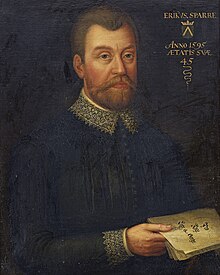
Back Erik Larsson Sparre Finnish Erik Sparre (1550–1600) French Erik Larsson Sparre Polish Erik Sparre (1550–1600) Swedish
Erik Sparre | |
|---|---|
 A 1595 painting of Sparre, holding his treatise Pro rege, lege et grege | |
| 3rd Lord High Chancellor of Sweden | |
| In office 1593 – 20 March 1600 | |
| Monarchs | John III of Sweden Charles IX of Sweden |
| Preceded by | Nils Gyllenstierna |
| Succeeded by | Svante Bielke[a] |
| Privy Councilor | |
| In office 1575 or 1576 – 19 February 1590 | |
| Monarch | John III of Sweden |
| Personal details | |
| Born | Erik Larsson 13 July 1550 Öja parish, Södermanland, Sweden |
| Died | 20 March 1600 (aged 49) Linköping, Östergötland, Sweden |
| Cause of death | Beheading |
| Spouse |
Ebbe Brahe (m. 1578) |
| Children | 12, including: Johan Lars Peder Ture Carl |
| Parents |
|
Erik Larsson Sparre (born Erik Larsson; also known as Erik Gyllensparre, Eric Sparre, or Erik Sparre of Rossvik;[b] 13 July 1550 – 20 March 1600) was a Swedish noble, statesman, diplomat, and political theorist who served as Privy Councilor from 1575 or 1576 until 1590 and Lord High Chancellor of Sweden from 1593 until his execution in 1600.
An esteemed orator and rhetorician, Sparre was considered the spokesman for the well-organized aristocratic opposition who advocated for parliamentary sovereignty in the Swedish government and is largely remembered for his contributions to Swedish law. His major written work – Pro lege, rege et grege ('For the Law, the King, and the People') – remains highly regarded as an early defense of contractualism and earned him a reputation as the "father of Swedish constitutional law". Sparre's ideas were initially backed by John III of Sweden in order to check the ambitions of his brother, Duke Charles, but relations between Sparre and John soured when the nobility was able to overrule the king's prerogative during a stand-off in Reval.
Sparre's diplomatic career was long and varied. He had early successes negotiating with the Danes in border disputes and helped to secure Sigismund III Vasa's accession to the Polish throne. During the discussions of Sigismund's election, Polish and Swedish tensions heightened after a misunderstanding about the annexation of Estonia, a fault that was blamed on Sparre. Following the death of John III in 1592, Sparre backed Sigismund's attempt to secure the Swedish crown from Charles, but failed to secure significant material gain from potential allies abroad. After Sigismund's defeat, Sparre was convicted of treason during a show trial and beheaded during the Linköping Bloodbath.
- ^ "Riksinsignier—Rikslikare". Nordisk familjebok. Linköping, Sweden: Project Runeberg. 1889. Retrieved 4 April 2024.
Cite error: There are <ref group=lower-alpha> tags or {{efn}} templates on this page, but the references will not show without a {{reflist|group=lower-alpha}} template or {{notelist}} template (see the help page).
© MMXXIII Rich X Search. We shall prevail. All rights reserved. Rich X Search